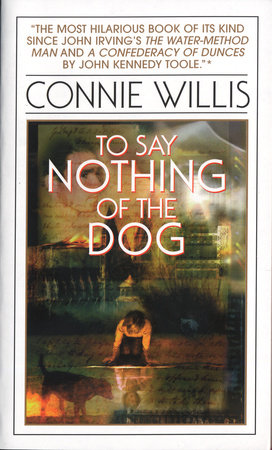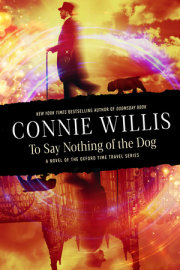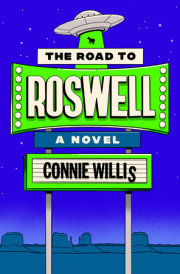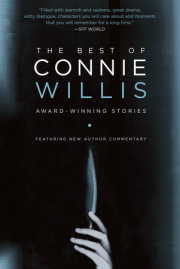"We must join hands," the Count said to Tossie, taking her hand in his. "Like this . . ."
"Yes, yes, we must all join hands," Mrs. Mering said. "Why, Madame Iritosky!"
Madame Iritosky was standing in the doorway, draped in a flowing purple robe with wide sleeves. "I have been summoned by the spirits to serve as your guide this evening in the parting of the veil." She touched the back of her hand to her forehead. "It is my duty, no matter what the cost to me."
"How wonderful!" Mrs. Mering said. "Do come sit down. Baine, pull up a chair for Madame Iritosky."
"No, no," Madame Iritosky said, indicating Professor Peddick's chair. "It is here that the teleplasmic vibrations converge." Professor Peddick obligingly changed chairs.
At least she hadn't sat down next to Verity, but she was next to Count de Vecchio, which meant she'd have one hand free. And next to me, which meant I was going to have an even harder time lifting tables.
"There is too much light," she said. "There must be dark—" She looked round the parlor. "Where is my cabinet?"
"Yes, Baine," Mrs. Mering said. "I told you to put it in here."
"Yes, madam," he said bowing. "One of the doors was broken, so that it would not lock properly, and I removed it to the kitchen for repairs. I have repaired it. Would you like me to bring it in now?"
"No!" Madame Iritosky said. "That will not be necessary."
"As you wish," Baine said.
"I feel that there will not be manifestations tonight," she said. "The spirits wish to speak to us only. Join hands," she ordered, draping her voluminous purple sleeves over the table.
I grabbed her right hand and grasped it firmly.
"No!" she said, wrenching it away. "Lightly."
"So sorry," I said. "I'm new at this sort of thing."
She laid her hand back in mine. "Baine, turn down the lights," she said. "The spirits can only come to us in candlelight. Bring a candle. Here." She indicated a flower-stand near her elbow.
Baine lit the candle and turned the lights down.
"Do not turn the lights up on any account," she ordered. "Or attempt to touch the spirits or the medium. It could be dangerous."
Tossie giggled, and Madame Iritosky began to cough. Her hand let go of mine. I took the opportunity to extend the wires from my wrists and hook them under the table.
"I beg your pardon. My throat," Madame Iritosky said, and slipped her hand in mine again. And if Baine had turned up the lights, it would have been dangerous, all right. I would have bet anything it would have revealed Count de Vecchio's hand in mine. Not to mention my own hanky-panky.
There was a faint rustling on my right. Verity, moving her garter into position.
"I've never been at a seance before," I said loudly to cover it. "We shan't hear bad news, shall we?"
"The spirits speak as they will," Madame Iritosky said.
"Isn't this exciting?" Mrs. Mering said.
"Silence," Madame Iritosky said in a sepulchral tone. "Spirits, we call you from the Other Side. Come to us and tell us of our fate."
The candle blew out.
Mrs. Mering screamed.
"Silence," Madame Iritosky said. "They are coming."
There was a long pause during which several people coughed, and then Verity kicked me on the shin. I let go of her hand and reached onto my lap, and lifted the lid off the basket.
"I felt something," Verity said, which wasn't true, because Princess Arjumand was brushing against
my legs.
"I felt it, too," the Reverend Mr. Arbitage said after a moment. "It was like a cold wind."
"Oh!" Tossie said. "I felt it just now."
"Is there a spirit there?" Madame Iritosky said, and I leaned forward and lifted up with my wrists.
Amazingly, the table actually moved. Only a little, but enough to make Tossie and Mrs. Mering both give their little screamlets and Terence to exclaim, "I say!"
"If you are there, spirit," Madame Iritosky said, sounding irritated, "speak to us. Rap once for yes, twice for no. Are you a friendly spirit?"
I held my breath.
Clack went the sugared violets box, and restored my faith in mystery novels.
"Are you Gitcheewatha?" Madame Iritosky asked.
"That's her spirit control," Mrs. Mering explained. "He's a Red Indian chief."
Clack, clack."Are you the spirit that I saw the other night?" Mrs. Mering said.
Clack."I
knew it," Mrs. Mering said.
"Who are you?" Madame Iritosky said coldly.
There was a silence. "She wants us to use the alphabet," Verity said, and even in the dark I could sense Madame Iritosky glaring at her.
"Do you wish to communicate by means of the alphabet?" Mrs. Mering said excitedly.
Clack. And then a second clack, a different sound, like someone cracking a knuckle.
"You don't wish to communicate by alphabet?" Mrs. Mering said, confusedly.
Clack, and a sharp kick on the shins.
"She does," I said hastily. "A B C—"
Clack."C," Tossie said. "O, Madame Iritosky, you told me to beware of the sea."
"What else?" Mrs. Mering said. "Do go on, Mr. Henry."
Not while there was a foot loose in here. I slid forward in my chair, stretching my left leg till it touched Madame Iritosky's skirt and pressed my foot hard against hers. "ABCDEFGHIJK," I said rapidly, my foot held tight against hers, "LMNO—"
Clack.She pulled her leg back, and I wondered what would happen if I clamped my hand down hard on her knee.
It was too late. "ABCD—" Mrs. Mering said, and the rapping sounded again.
"COD?" Mrs. Mering said.
"Cod," Professor Peddick said. "
Gaddus callerias, of which the most interesting variety is the Welsh whiting."
"'Will you walk a little faster,'" Terence quoted, "'said a whiting to a—'"
"Cod, coddle, cody," the Reverend Mr. Arbitage said. "Are you the ghost of Buffalo Bill Cody?"
"No!" I shouted before anyone could rap an answer. "l know what it is. It's not a C, it's a G. C and G look nearly alike," I said, hoping no one would notice the letters had been spoken, not written, and that they were nowhere near each other in the called-out alphabet. "G-O-D. She's trying to spell Godiva. Are you the spirit of Lady Godiva?"
A very decisive
clack and we were, thankfully, back on track.
"Lady Go
diva?" Mrs. Mering said uncertainly.
Tossie said, "Is she the one who rode a horse without any—?"
"Tossie!" Mrs. Mering said.
"Lady Godiva was a very holy woman," Verity said. "She had only her people's best interests at heart. Her message must be very urgent."
"Yes," I said, pressing hard against Madame Iritosky's leg. "What are you trying to tell us, Lady Godiva? ABC—"
Clack.I rattled through the alphabet again, determined not to leave any spaces this time for Madame Iritosky to insert a rap. "ABCDEFGHIJK—"
I made it as far as M. There was a sharp rap, like a very annoyed toe being cracked. I ignored it and pressed on to O, but to no avail.
"M," Mrs. Mering said. "CM."
"What sort of word begins with CM?" Terence said.
"Could she be saying 'come'?" Tossie said.
"Yes, of course," Mrs. Mering said. "But where does she wish us to come? ABC—" and Verity clacked on cue, but I didn't see what good it was going to do us. We'd never make it to "o," let alone "v."
"A—" Mrs. Mering said.
I stamped down hard on Madame Iritosky's foot, but it was too late.
Rap. There was no mistaking the fury behind the rap this time. It sounded like she'd broken a toe.
"C-A—" Mrs. Mering said.
"Cat," Madame Iritosky pronounced. "The spirit is trying to communicate news of Miss Mering's cat." Her voice abruptly changed. "I bring you word of Princess Arjumand," she said in a low husky growl. "She is here with us on the Other Side—"
"Princess Arjumand?" On the Other Side?" Tossie said. "But she can't be! She—"
"Do not grieve that she has passed over. She is happy here."
Copyright © 1997 by Connie Willis. All rights reserved. No part of this excerpt may be reproduced or reprinted without permission in writing from the publisher.










